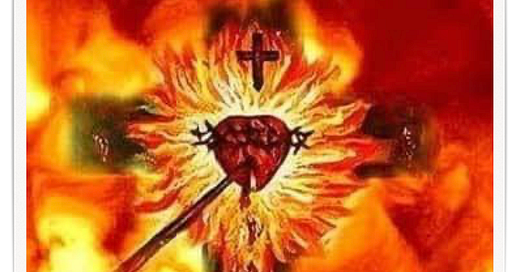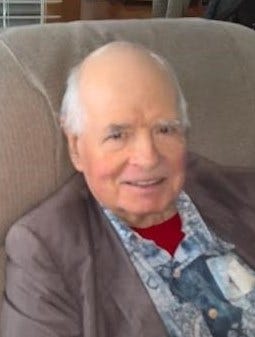John Archibold was a pro-life lawyer who fought for life starting in the 1960s and was present at Roe vs. Wade. He dedicated his life to the defense of the unborn and came into the Catholic Church with his wife Molly after World Youth Day, ‘93 in Denver. I was honored to have served as their catechist way back then. They became good family friends.
Two weeks ago, I was privileged to pray bedside with John. During our rosary, he was drifting in and out of consciousness. But as soon as I sang “Ave Maria” or “Salve Regina”, he would open his eyes and join in. He was in his nineties - but the whole intensity of the love, ache and beauty of life was alive in him. The priest from his parish brought him communion and prayed with him to the very end, making his final days very Eucharistic. During my visit, our conversations were not long, but we whispered a few words about the meaning of Christian death, how it is a great offering to God, a supreme moment of a man’s life. Frequently partaking of Holy Communion gave John strength for this solemn moment.
As he died, the Church was gathering in Indianapolis for the Eucharistic Revival. The fact that John was called home just as the event was beginning is not insignificant. He profoundly believed in the Eucharist and became Catholic because he felt the need to go to daily Mass. His love for life, love for the unborn, was somehow connected to this devotion. I dedicate this reflection to John and ask you to pray for the repose of his soul and his family.
In the mystery of humanity, the bodily and spiritual come together in the confrontation of sin with grace, of death with new life. This is true even in the meals we share. There is no partitioning off of life — where sacred and profane are ever completely fragmented apart from each other. What is sacred provides orientation to the profane - and the secular drifts into nihilism without the eternal to hold it up. Even what would seem most mundane, the act of feeding ourselves, has spiritual content, a meaning that the limits of mortality cannot contain. Those ignorant of this content risk the loss of a meaningful life.
The Eucharist is a sacrificial banquet. The Body of Christ offers up a great gift to the glory of the Father and for the salvation of the world. This gift is Christ Himself whose sacrifice of filial obedience is renewed whenever the Church gathers in prayer, especially in the Eucharist. Among the signs of this sacrifice is bread, and understanding this sign can help us enter even more deeply into the sacrificial blessing we share through it.
Something about what we share at table springs from and leads to blessing. Indeed, the meaning of bodily food is not exhausted by the nutrients it contains. Food is meant to be sacramental, a physical sign of a spiritual blessing. And without these blessings, no matter how exquisite the cuisine, the food does not really satisfy. One can suffer from an empty heart no matter how full the stomach. The heart suffers a hunger that the body does not know. So we begin our meals with grace, offering thanks, seeking a blessing - for only in blessing can the heart bear the unbearable ache of life.
More than physical food for the body, life requires food for the heart. God knew this when He declared to Adam in the face of the thorns, thistles and sweat of his punishment, those who remained faithful to the purpose that He set out for them would receive bread for themselves and for their families. The psalms declare that this bread strengthens the heart. At the time of Moses, Manna in the desert was about so much more than bodily sustenance. It was a sign of God’s providence and loving concern, a bodily good that pointed to His presence with them in the desert. The priests of the Old Covenant would make hot bread offerings that they set in the presence of God, as if that presence were a spiritual furnace, and the bread itself they celebrated as a blessing attached to an incense offering. These same priests would eat this bread of the presence to strengthen themselves for the ministry. King David also ate this bread - as if something about his kingship were also priestly, an offering for the people. For Elijah, only the Bread of Angels could give him strength in the face of death, So, he journeyed by this bread to hear the voice of God. It is in this context that Jesus commanded us to ask the Father for our daily bread. He knew that the heart needed the Word of God more than bodily food. So the Word of the Father made Himself into food to feed our deepest spiritual needs. Jesus Christ declared that his own flesh was real food and that his blood was real drink. He gave this food to us when He took bread, blessed and broke it. So powerful was this sacrificial blessing that His disciples recognized Him in the breaking of the bread even after His death and resurrection.
What kind of sacrificial blessing does Christ’s breaking of the bread constitute? It changes bread and wine into His very body, blood, soul and divinity. It is the lifting of the heart from earthly cares to heavenly mysteries. It is an offering to the Father that is right and just. It is a memorial of his passion. It is a pouring forth of all the graces that were won for us on the Cross. It is the medicine of immortality and the antidote for death. It is a pledge of future glory.
When we partake of this Bread of Life, what feeds our soul? In the body and blood, soul and divinity of the Lord one partakes in a presence so unique and powerful that the Church calls it “real.” This real presence of Christ always communicates the Holy Spirit. This is true when the faithful assist at Mass. It is true when they receive Holy Communion. It is even true when, after Mass, they adore the Real Presence of the Lord, especially when that presence is exposed to be gazed upon with their eyes in exposition. Every other blessing that any other kind of food allows men to share with each other either comes from or flows into this great blessing - for the Holy Spirit is the greatest blessing of all.
The Eucharist communicates the gift of the Holy Spirit. In the harsh cold of death, the Holy Spirit is Himself the Fire that strengthens, that ignites, the heart. With this Fire, no matter the circumstances, no matter the failure, the eyes of the heart behold the goodness of God and a new courage surges in the innermost depths of one’s being. Even as one dies, with this Fire, one is fully alive. That is why the early Christians believed that to consume this Living Bread is to consume fire:
“God is fire and when He came into the world, and became man, He sent fire on the earth, as He Himself says; this fire turns about searching to find material — that is a disposition and an intention that is good — to fall into and to kindle; and for those in whom this fire will ignite, it becomes a great flame, which reaches Heaven…. this flame at first purifies us from the pollution of passions and then it becomes in us food and drink and light and joy, and renders us light ourselves because we participate in His light” (St. Simon the New Theologian, Discourse 78)
John, may perpetual light shine upon you and may you rest in peace!






Thank you for fanning the flames that draw us to heaven. Praying for John with so much confidence and a fiery heart.